
 The initial reaction from many following this month’s key gathering of communist-party leaders in China was of disappointment as Tuesday’s blueprint left much to be desired. But on Friday came a significantly more in-depth document regarding issues like land reform, easing of the one-child policy and cleaning up pollution.
The initial reaction from many following this month’s key gathering of communist-party leaders in China was of disappointment as Tuesday’s blueprint left much to be desired. But on Friday came a significantly more in-depth document regarding issues like land reform, easing of the one-child policy and cleaning up pollution.
It’s all left famed investor Jim Rogers believing “the most important economic event of the next 10 to 20 years is what happened in Beijing.” And it’s something he says has been largely ignored, notably by Western media.
During a visit at the Wall Street Journal, the former George Soros partner–who retired from Wall Street at age 37 to live a second life as world traveler—equates the plenum to those in 1978 and 1993. The first followed Mao Zedong’s death and ushered in Deng Xiaoping’s reformist agenda and his effort to remake China’s economy, while 1993’s plenum included a vow to deal with money-losing state enterprises.
In the just-concluded gathering, which occurred a year after President Xi Jinping became party chief and was seen as his stage to set forth the agenda for his possible 10-year tenure, reform was hoped to be a big focus.
Mr. Rogers, who moved with his family to Singapore seven years ago, senses change is coming.
The land reform includes increased rights for farmers. This group has long seen land taken from them but now are in position to amass large tracts for more-efficient production in a country struggling to keep up with a populace that has increasing amounts of money to spend on food.
Chinese agriculture has been ruined since Mr. Mao’s tenure, says Mr. Rogers, capped off by the Cultural Revolution, during which teens were sent to the country to work on collective farms. But while current efforts, if followed through, could take upwards of a generation to really bear fruit, Mr. Rogers sees Chinese agriculture as a sector in which to invest, as well as railroads, medical care and defense.
“These industries will do well even” even if the country’s stock market collapses, he contends. Mr. Rogers has been buying Chinese stocks, including financials, for the first time since 2008; he previously was a purchaser in 1999 and 2005.
Also seen changed by his perspective is politicians’ resolve. “The overriding concept” from the plenum is “when in doubt, the market will decide.” For a state-controlled economy, that sounds like a 180 to past practices.
So why think the new leadership isn’t just giving reform lip service? Mr. Rogers admits he can’t be sure, but the investor—who came to New York from China and will soon be back in country–senses something different. “As previous administrations tried to change, they ran into the bureaucracy.” But now, policy makers “seem to have the wind at their back” and leaders have “put a lot of prestige on the line.”
The reform effort would come amid years of talk about China’s economy being a bubble or that its ascendance will end. Mr. Rogers says that reminds him what Europeans said about the US after the Civil War. Then, the New World was still considered an untamed backwater. But he notes things change quickly: Within a generation after World War I, the undisputed No. 1, the United Kingdom, was no longer that.













